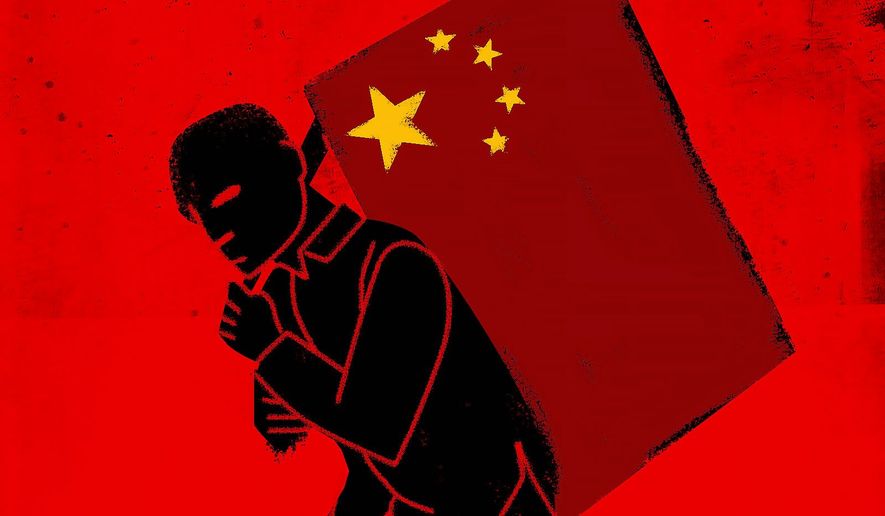OPINION:
In America, availability and abundance are a way of life. The goods coming into the United States from overseas provide us with what we want and sometimes what we don’t, meaning America inadvertently still ends up on the wrong side of the fight against human trafficking and forced labor.
Strict, reasonable precautions at the nation’s ports are the first order of business in this fight, something I learned in nearly a year as chair of the U.S. Department of Transportation’s Advisory Committee on Human Trafficking. In our final report to the secretary, we suggested changes that, if made in a perfect world, would bring the trafficking in persons to a standstill.
The problem of trafficking at our nation’s ports is tied to the import of manufactured goods. Trafficked persons are smuggled into the United States on ships, sometimes as passengers, sometimes as freight, trapped inside cargo containers. Stopping this requires vigilance and better cooperation between the U.S. Department of Transportation, the U.S. Customs and Border Patrol Agency (a part of the Department of Homeland Security), state law enforcement and community police. Our report said as much.
Happily, considerable progress has been made in cooperation with private industry yet no one entity has enough resources to eliminate this problem. Someone will always find new ways to exploit people for profit. To defeat them we must be more diligent, more alert, smarter and more determined to wipe out trafficking than they are to keep it going. This includes stopping the importation of goods made using forced labor — another practice abetted by trafficking in persons.
This is principally a job for the U.S. Customs and Border Patrol Agency, one of our essential partners on the secretary’s Advisory Commission. Therefore, I was disturbed to learn recently that CBP may sometimes miss the boat while trying to stop the importation of goods produced with forced labor.
In June 2021 the CBP issued a “Withhold Release Order” or WRO addressing imported goods that include materials made by the Hoshine Silicon Industry Company of Xinjiang, China. Hoshine is suspected of using forced labor in its production process. That means any goods coming into the United States that include its silicon materials — like the solar cells and panels made by Hanwha Q Cells and Maxeon Solar Technologies — should be stopped. Instead, they appear to have evaded detention.
It may be that, because they are not Chinese companies, the linkage is not immediately clear. Or perhaps the veneer of U.S. manufacturing in the case of Hanwha Q Cells or announcements to explore U.S. manufacturing in the case of Maxeon Solar Technologies incentivizes folks to look the other way. Both companies are strategically tied to and buying components from Tianjin Zhonghuan Semiconductor which — as Sheffield Hallam University researchers discovered — uses Hoshine materials.
If that alone was not enough to establish a link to Hoshine, Hanwha Q Cells — whose parent company also operates a factory in Xinjiang — gave TZS an Excellent Supplier Award. TZS also owns 28.8% of Maxeon, which admits in its SEC filings to using its components in products imported to the U.S. Yet no action appears to have been taken thus far to keep Hanwha Q Cells and Maxeon cargo on the docks.
We cannot allow the rush to import items the American people want, perhaps even need during a period in which we’re experiencing shortages to undermine the fight against human trafficking. The people on the front lines have a responsibility to undermine the activities of the modern-day slavers at every turn. The system’s not perfect. Plenty of warlords, dictators and others among the oppressive class manage to find ways around the sanctions. Which makes it important to be able to tell the difference between the bad actors and the good ones.
The effort to expose and stop the use of forced labor in manufacturing should be as serious as the ongoing work by the U.S. government and private industry to stop human trafficking. These are human rights abuses of the highest order. The CBP needs to be as thorough in cases where the linkage may not be obvious as it is in the cases that are.
Effective enforcement, undertaken fairly and equally, will put a dent in the activities of modern-day slavers. Lumping the bad actors in with the good because it is faster or more convenient provides a perverse disincentive to follow the law and do what’s right.
• Ambassador Catherine Todd Bailey served as the chair of the U.S. Department of Transportation’s Advisory Committee on Human Trafficking under Secretary Elaine Chao.




Please read our comment policy before commenting.